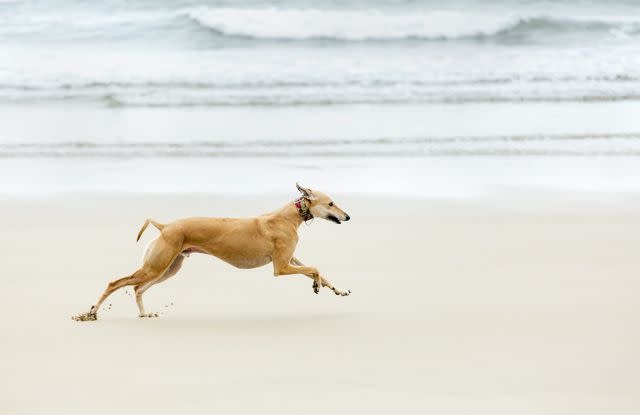How Fast Can Dogs Actually Run?

Here's what you need to know.
Ever noticed how fast your dog can book it around the backyard when he has the zoomies, or how he races neck and neck with the fastest dogs at the dog park? Or maybe you're impressed with the stamina of your canine companion when he keeps up with you on a 3-mile jog. Some dogs can really run. But how fast, really, and which is the fastest breed?

How Fast Can A Dog Run?
The answer varies widely based on breed. To get a sense of the possibilities, we checked with the American Kennel Club, which holds an annual 100-yard dash competition called the Fast CAT.
"At top speed a Pembroke Welsh Corgi can run 25 mph," the organization states. "That’s faster than Usain Bolt’s 100-meter record of 9.58 seconds, which equates to 23.35 mph. So yes, those little legs can fly."
The fastest Whippet averaged 35 mph at the Fast CAT in 2020, while the fastest Pekinese ran about 7.4 mph.
What's The Fastest Dog Breed?
"Although there is occasionally some competition from breeds like the Saluki, Afghan Hound, and Vizsla, the fastest breed is the Greyhound," says Dr. Georgina Ushi Phillips, a veterinarian who blogs at Not a Bully, a site on a mission to help people learn about misunderstood breeds.
Phillips says breeds like the Vizsla can reach speeds of up to 40 miles per hour, which isn't quite as fast as a Greyhound's top speed of 46 miles per hour, but the Vizsla still may be faster when it comes to more complicated terrain like trails or wooded areas.
However, when it comes to level ground and short distances, the Greyhound is almost impossible to beat. "The Greyhound has flexible joints and a spine that allows them to take huge strides," says Phillips. Even though the breed is much smaller than a horse, Greyhounds have been clocked running stride for stride with Kentucky Derby thoroughbreds.
Even more impressive, the Greyhound was built for high speeds over short distances with a larger-than-average heart size that improves their circulation and more fast-twitch muscle fibers to help them make sudden and more powerful moves.
Which Breeds Are Best At Distance Running?
What if you need a canine companion to say, train for a marathon with? "Breeds like the Siberian Husky can run well over 100 miles per day which is no surprise when you consider their work as sled dogs," says Phillips.
Also, some hunting breeds, like the Weimaraner, were bred to chase game long distances and can put in several dozen miles a day with the proper training. Plus, you'll often find owners with Dalmatians, Vizslas, German Shorthaired Pointers, Doberman Pinschers, Boxers, Brittany Spaniels, and Labrador Retrievers who are well-suited as running buddies.
Which Breeds Are Slowest?
"There's actually quite a bit of competition for the slowest breed with many smaller, short-faced breeds (slowly) leading the charge," says Dr. Phillips. Breeds like the pug, Lhasa Apso, and Shih Tzu are all quite slow, but the English Bulldog is likely the winner. With his respiratory limitations, a large barrel body, and short legs, the breed wasn't built for speed.
Is It Safe To Take Your Dog On A Run?
Dr. Sarah Wooten, a veterinarian at Pumpkin Pet Insurance, says that just as in humans, extensive running breaks down the joints of dogs and can lead to early-onset osteoarthritis.
"It is also important to note that dogs don't make good running partners until they are fully done growing, as extensive pounding on open growth plates can cause joint disorders and arthritis," says Dr. Wooten. Since dogs finish growing at different times based on their size and breed, it's best to ask your veterinarian when it's safe to run with your dog and try to stick to softer surfaces, such as dirt trails, sand, and grass. Whether you have a slow runner or a fast sprinter every dog runs at his or her own pace so enjoy the journey.
Always consult your veterinarian if you have questions about your dog's health or activity.
For more Southern Living news, make sure to sign up for our newsletter!
Read the original article on Southern Living.